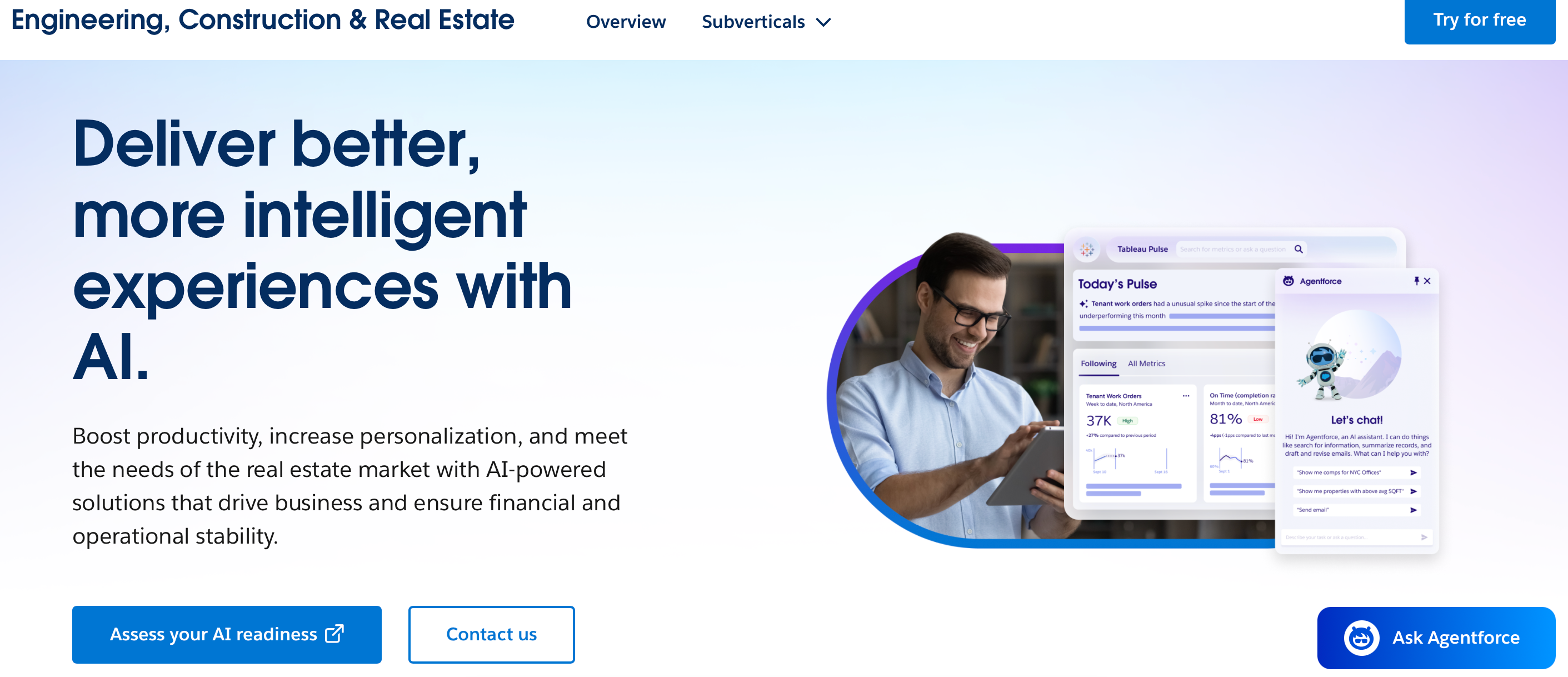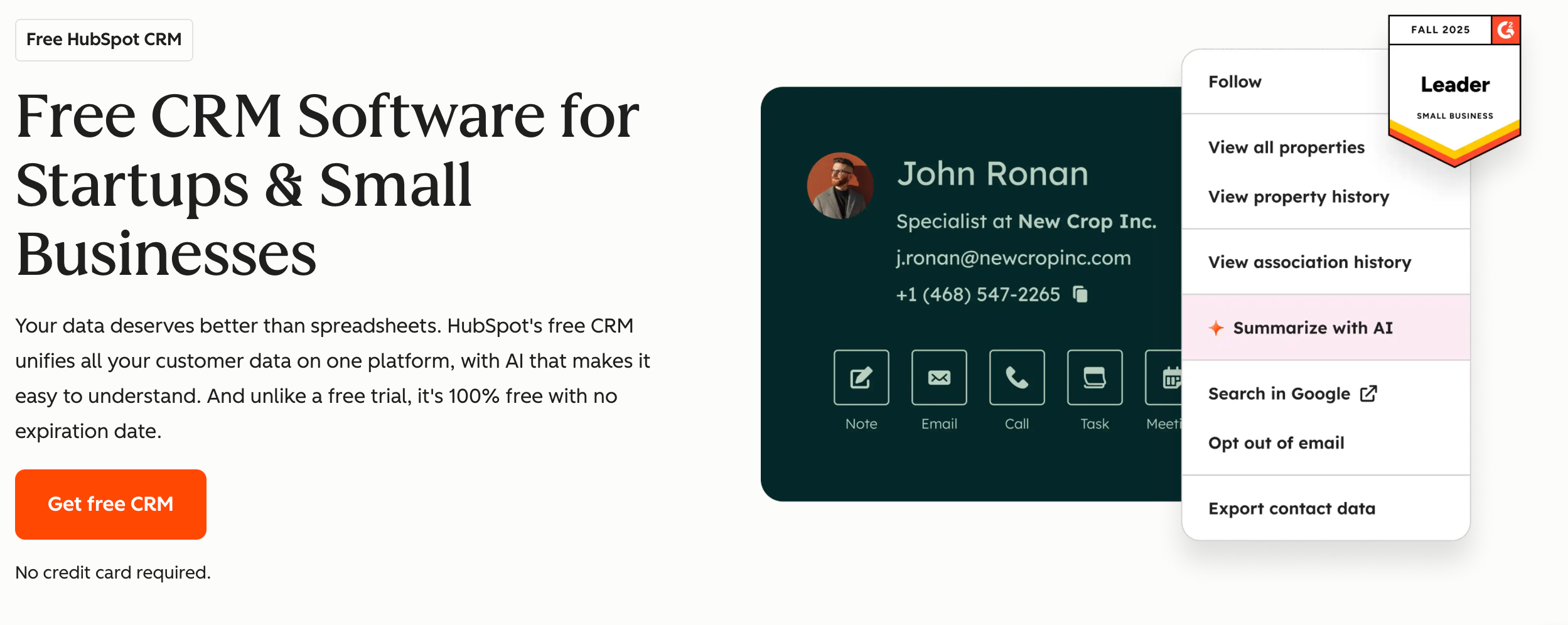CRM Commercial Real Estate Software for 2025: Top Picks and Features
The right commercial real estate CRM helps you stay organized, track deal flow, automate follow-ups, and maintain strong relationships at every stage of the pipeline.
Managing clients, prospects, listings, leases, and property data across spreadsheets and email threads can work—for a fairly short time. But as your real estate portfolio, professional network, and marketing campaigns grow, so does the complexity.
In this article, we’ll break down the best CRM software options for commercial real estate, highlight key features to look for, and help you determine which platform best aligns with your workflow and goals so that you can score and manage deals.
What You Should Know
- CRM systems help with project management, managing client relationships, driving efficiency in commercial real estate.
- Key features of effective commercial real estate CRMs include contact management, property management, and lead generation tools that streamline operations and enhance productivity.
- The integration of AI and advanced analytics in CRM software is reshaping the commercial real estate landscape, enabling better insights, lead management, and streamlined processes.
What is a CRM for Commercial Real Estate?
Imagine a typical day in commercial real estate: you’re juggling multiple property tours, following up with investors, reviewing lease terms, and prepping new listings.
There are phone calls to return, emails to send, and deals moving at different speeds. It’s a lot to manage—and missing one follow-up or forgetting one detail can mean losing momentum on a high-value opportunity.
Yes—you need a cloud based CRM.
A CRM (customer relationship management system) is the central hub that keeps commercial real estate professionals organized. It stores every contact, conversation, document, and deal stage—so instead of searching through spreadsheets or digging through email threads, everything you need is in one place. A good CRM helps you manage relationships, track your pipeline, generate leads, and ensure no opportunity slips through the cracks.
But today’s real estate CRMs go beyond basic data storage. Modern platforms support collaboration across teams, automate repetitive tasks, and offer dashboards that highlight your most important opportunities. They help you answer questions like:
- Which investors are ready for follow-up?
- Which properties need attention today?
- Which deals are closest to closing?
In commercial real estate—where deals are complex, timelines are long, and every relationship matters—these insights are crucial.
Whether you’re a commercial real estate broker, a property manager overseeing multiple buildings, or part of a real estate team coordinating deals, the right CRM becomes more than software. It becomes your command center—supporting smoother operations, savvy marketing tools, stronger client relationships, and ultimately, more closed deals.
Key Features of Commercial Real Estate CRM Software
A good CRM for commercial real estate should support relationship-building, deal flow, and day-to-day property operations. Here are the essential features to look for:
Contact Management
Commercial real estate professionals rely on strong relationships. A CRM with robust contact management lets you store client details, track communication history, and schedule follow-ups—ensuring every interaction is recorded and actionable.
Property and Listing Management
Look for tools that help manage properties, tenants, client data, sales performance, and listings in one place. These features make it easier to schedule showings, track maintenance needs, and keep property data organized across your portfolio.
Lead Capture and Follow-Up Automation
To generate leads consistently, choose a CRM that integrates with your website, email, and marketing channels. Automation tools can handle reminders, drip campaigns, and follow-ups. When it comes to using CRM data most effectively, it’s important that no opportunity slips through the cracks.
Pipeline and Deal Tracking
Real estate deals move fast. A visual pipeline helps you see where every opportunity stands and what needs to happen next, improving both forecasting and closing speed.
By combining these essential features, a good CRM helps commercial real estate professionals stay organized, nurture relationships, and focus more on closing deals—not managing spreadsheets.
Top CRM Platforms for Commercial Real Estate Professionals
Choosing the right CRM matters, especially when managing complex deals, property data, and long sales cycles. While there are many platforms in the market, iHomeFinder is a strong choice for commercial real estate professionals who want integrated marketing, lead generation, and property search tools in one place.
Below, we’ll outline the core differences between iHomeFinder and other commonly used CRMs.
iHomeFinder (Best Fit for Commercial Real Estate Workflows)
iHomefinder is a powerful real estate CRM that combines IDX property search, lead capture, and automation tools to help agents grow their business. All the tools provide agents with key data about potential buyers and sellers, allowing for personalized outreach and follow-ups.

Why it stands out:
iHomeFinder combines CRM features, contact management, IDX website functionality, and automated lead follow-ups into a single platform. For commercial real estate professionals, this means fewer disconnected systems and business tools, but a clearer pipeline from first inquiry to closed deal.
iHomfinder is perfect for:
- Managing contacts and communication history for commercial real estate companies
- Capturing and nurturing leads from your website
- Providing property search access with commercial listing data
- Automating follow-ups and alerts based on client behavior
- Modern, intuitive back office management to keep processes flowing smoothly
Instead of juggling multiple platforms, iHomeFinder keeps marketing + CRM + property search under one roof, making day-to-day deal management more efficient.
Salesforce CRM
Salesforce for real estate is another configurable CRM option that allows you to tailor workflows, data models, and integrations to fit your business.
This platform is best when deployed by teams with internal admins or technical support, due to strong automation and analytics capabilities. Commercial real estate firms may end up layering add-ons or third-party integrations to fully address industry-specific needs within Salesforce.

HubSpot CRM
HubSpot CRM provides contact management, email automation, and pipeline tracking in one system. It can support general sales and marketing workflows across a variety of industries. However, it does not include built-in tools for property search or listing management, so commercial real estate teams typically use it alongside additional real estate software.

SharpLaunch
SharpLaunch is a commercial real-estate marketing platform built for property owners, asset managers, and brokers. It offers tools for creating property websites, capturing leads, and running marketing campaigns.
Although it provides capabilities around marketing and listings, it is often used in conjunction with a more complete CRM system. That’s because users might need deeper contact management and deal-tracking workflows.

Benefits of Using CRM Software in Commercial Real Estate
A good CRM doesn’t just store information or organize contacts. Instead, it actually helps you use those data points for growth.
With built-in analytics and reporting, you can spot trends, understand which relationships need attention, and make clearer decisions about where to focus your time.
And because real estate isn’t “stuck” at the desk, most modern CRMs require mobile access. Whether you’re touring a property, grabbing coffee with a client, or driving between showings, you can update notes, respond to leads, and check your pipeline right from your phone.
No more “I’ll follow up when I’m back at the office.”
A CRM also keeps everyone on the same page. Instead of scattered spreadsheets or unclear hand-offs in the sales pipeline, your team shares one source of truth—contacts, communication logs, deal stages, and documents in one place.
Let’s recap what these management tools can do for you:
- Enhances sales team productivity
- Scale pipeline management
- Ensure access to the most recent information
- Save time for solo agents or small brokerage teams
- Keep data organized for a better sales process
- Provide a better way to manage leads or track leads
- Improve communication within teams thanks to workflow automation
Overall, CRM software is a game-changer for commercial real estate professionals to help you work smarter, not harder.
Implementation Tips for CRM Software in Commercial Real Estate
Implementing CRM software in a commercial real estate business can be a smooth process with the right approach. Always consider these steps:
- Train team members on the new CRM to maximize productivity and adoption
- Ensure that everyone understands the system’s task management features
- Highlight how team members can benefit from new CRM perks
Common Challenges and Solutions in CRM Adoption
Implementing a CRM system can transform how a commercial real estate team operates—but only if it’s adopted effectively. Here are a few common challenges and practical solutions:
- Resistance to Change – It’s natural for teams to be hesitant about new systems. Show the value early—demonstrate how the CRM systemsimplifies daily tasks, reduces manual work, and improves communication. Offering small incentives or sharing quick wins can also help encourage adoption.
- Limited Training – Even the best CRM system won’t deliver results if people don’t know how to use it. Invest in hands-on training, video walkthroughs, or “office hours” where agents can ask questions. Confidence in the system leads to higher engagement and better results.
- Unclear Goals – Without a clear purpose, a CRM system can feel like busywork. Define what success looks like—whether it’s tracking deal stages, managing client touchpoints, or improving follow-up times—and share that roadmap with the team.
- Data Accuracy – Outdated or incomplete data can quickly erode trust in your CRM system. Set clear data-entry standards and schedule regular cleanups to ensure information stays accurate, reliable, and actionable.
- Technical or Integration Issues – If your system doesn’t sync smoothly with email, marketing, or property tools, adoption will stall. Work with your vendor or IT team to streamline integrations early and test thoroughly before rollout.
By addressing these challenges upfront, commercial real estate professionals can ensure smoother CRM system adoption—leading to stronger collaboration, better client relationships, and long-term productivity gains.
Future Trends in Commercial Real Estate CRM Software
As we look ahead, several trends are set to transform the landscape of commercial real estate CRM software. A significant trend is the integration of AI, which:
- Enhances CRM system efficiency by personalizing client marketing experiences
- Automates administrative tasks
- Includes AI agents within CRM systems that can autonomously meet employee and customer needs
- Streamlines operations and reduces the time spent on repetitive tasks
Data analytics will continue to play a vital role in uncovering insights that can drive sales and improve decision-making. The ability to analyze vast amounts of customer data and extract actionable insights is extremely helpful for growing commercial real estate initiatives.
Additionally, AI significantly impacts a real estate agent’s work by saving time on administrative tasks and providing insights into deal probabilities. This allows agents to focus more on building meaningful relationships and closing deals.
Bringing It All Together
For modern real estate businesses, the right CRM software can truly be a game-changer. It brings together everything that drives success in commercial real estate—from stronger client relationships and smarter contact management to more efficient lead generation and data-driven decision-making.
Platforms like iHomeFinder each offer tools that help real estate professionals stay organized, track deals, and maintain meaningful connections with clients. The best CRM systems make it easier to manage your pipeline, automate routine tasks, and focus on what matters most: building lasting client relationships and closing more deals.
Frequently Asked Questions (FAQs)
What is the primary purpose of a CRM in commercial real estate?
The primary purpose of a CRM in commercial real estate is to effectively manage client relationships and streamline operations, ultimately enhancing productivity through organized data and automated workflows. By utilizing a CRM, professionals can strengthen client interactions and improve their overall business efficiency.
What are the key features to look for in a commercial real estate CRM?
When choosing a commercial real estate CRM, prioritize contact management, property management, lead generation tools, and automation features. These elements are essential for effective communication, efficient property maintenance tracking, and streamlined administrative tasks.
How does CRM software benefit commercial real estate professionals?
CRM software significantly enhances efficiency for commercial real estate professionals by improving marketing automation, lead tracking, and client communication. This leads to better collaboration and actionable insights, ultimately elevating client service.
What should I consider when choosing a CRM for my commercial real estate business?
When choosing a CRM for your commercial real estate business, prioritize scalability, customization, budget, security features, and integration capabilities. Align the CRM with your specific requirements and strategic business goals for optimal benefits.
What are the future trends in commercial real estate CRM software?
The future of commercial real estate CRM software will be shaped by the integration of AI and data analytics, which will automate tasks, personalize marketing, and deliver valuable insights. This evolution will empower professionals in the industry to operate more efficiently and effectively.





Leave a Reply
Want to join the discussion?Feel free to contribute!